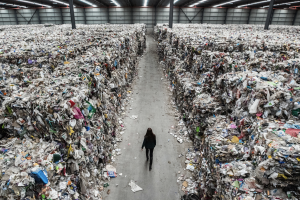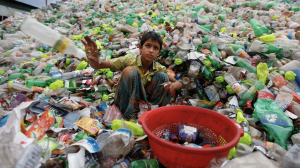By Nithya Narayanaswamy, rising junior at Emory College and Co-Founder of Plastic Free Emory.

“Do you ever feel, like a plastic bag,
Drifting through the wind,
Wanting to start again?”
If you sang those Katy Perry lyrics in your head, congratulations. While you most certainly are a firework, baby, you are probably also an advocate for a plastic-free world, drink an oat milk latte, and carry a metal straw in your backpack. Here’s why.
The plastics crisis. A global crisis punctuated by disparaging images of choking oceans, dying turtles, endangered wildlife, and heaping landfills. However, these images tell only a part of the story; much before they make it to their ‘single use’, many single-use plastic items track paths that create unsustainable monopolies over entire sectors, corporations, and communities, putting social stability, justice, and well-being in jeopardy.
Drilling for natural gas and oil kickstarts the plastic monopoly by jeopardizing ecological spaces, disturbing wildlife, and unfurling pipelines through historically underserved neighborhoods or sacred Indigenous land. The plastics industry moves on to place incineration facilities and manufacturing facilities in BIPOC and underrepresented neighborhoods, exposing them to toxic greenhouse gas emissions, and microplastic contamination, capitalizing on their marginalization. Furthermore, an imbalanced consumer-producer responsibility puts the burden on us, the consumers, to find a way to deal with the plastic that penetrates our communities and ecosystems. When a person walks into a grocery store to buy a bag of candy, it is rarely the plastic packaging that is their motivator. And yet, it is the perfect commodity; companies charge for packaging, advertise packaging, and shift the burden on us to dispose of it.
And yet, despite the thin film packaging and the plastic straw, plastic itself is very often a blessing. It is an essential part of our technological development, healthcare, and economic stability. It presents a durable and lightweight alternative to expensive conduits, gear, and packaging and is used to maintain sterility in hospitals, and package medicines, food, and essentials. Plastic can even champion inclusivity and accessibility, by providing affordable, easy-to-use alternatives for people who need them. Used responsibly, plastic connects people, builds communities, and saves lives; but today, it is trapping us within a peculiar paradox of convenience versus unsustainability.
The core of the plastics problem lies in its disproportionality. It is a bigger problem for some people than for others, and as a result, the truth behind the crisis —the imbalance between corporate and individual responsibility— is hidden by false solutions and narratives that are simply not enough to mitigate the multitude of harms toward our environment and communities.

If you are a social justice advocate, a feminist, an LGBTQ+ activist, a human rights advocate or someone who cares deeply about your community, chances are, you are already advocating against the plastics crisis. ‘Plastic-free’ not only represents a major reduction in our plastic consumption, but also, freedom from the systemic injustices and multiple oppressions perpetuated by the plastics industry. It scaffolds the hopes for climate justice, health equity, BIPOC representation, equality and so, so much more.
Confronting this ubiquitous crisis is multifold, and understanding its intersectionality is key to breaking free from it. So what can we do? Learn how the plastics you consume impact the communities and people around you; from your clothes to your teabags, ask where, how, and by whom they were made, and after their use, where they will go. Learn their story! Most importantly, be a responsible consumer. No, the onus isn’t all on a handful of people to fix the oceans, but in numbers, we’ll create waves of change! Support businesses that are taking a stand for a more sustainable future, and take action to shift the default from large corporations that threaten our communities.
Although it often feels like it, the plastics crisis isn’t all doom and gloom. The ‘Break Free From Plastic’ movement has proliferated across the United States, and even into Congress, as the Break Free From Plastic Pollution Act, one of the most comprehensive bills on the plastics crisis ever introduced into Congress. Even within our own community, Emory University recently signed a ‘Break Free From Plastic Pledge’, which outlines a five-year phase out plan for unnecessary single-use plastic on campus. Sign petitions, support Plastic Free Bans, or join our very own Plastic Free Emory; use your voice to demand, initiate and effect change.
The ‘Plastic Free’ movement represents hope for a better future; one that is kindled by your visions of a society that prioritizes inclusion, diversity, equality, and justice. A society where we have —no, not plastic bags— but the euphony of our voices united for change, drifting through the wind.
Learn more about Plastic Free Emory at plasticfreeemory.carrd.co.

Thanks for sharing this insightful look at plastic manufacturing in the United States. These companies are leading the charge in innovation and quality, setting a high standard for the industry. Their commitment to sustainability and advanced technology is truly impressive.